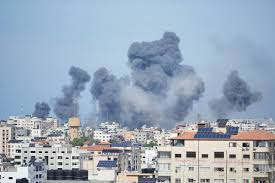The Israel-Gaza conflict has long been a focal point of global attention, sparking fierce debates, protests, and discussions. The most recent military operations conducted by Israel in Gaza have drawn harsh criticism, with many labeling them as an "illegal invasion." To fully understand the implications of this accusation, it's essential to delve into the historical context, legal frameworks, and humanitarian concerns surrounding the conflict.
Historical Context of the Israel-Gaza Conflict
The Israeli-Palestinian conflict dates back more than a century, with roots in territorial disputes, national identities, and colonial legacies. Gaza, a small coastal strip, became a flashpoint of conflict after the 1948 Arab-Israeli War. Following the 1967 Six-Day War, Israel occupied Gaza and the West Bank, an action condemned by much of the international community. In 2005, Israel withdrew its settlers and military from Gaza, but it has maintained a blockade since 2007, when Hamas took control of the area.
The decades of tension, intermittent wars, and cycles of violence between Israel and Hamas have had a devastating impact on civilians. Israel justifies its military actions as self-defense, while Palestinians and their supporters argue that these operations constitute illegal invasions of sovereign territory, exacerbating the suffering of the people in Gaza.
Legal Perspectives on the Invasion
The legality of Israel's military actions in Gaza is a deeply contested issue. According to international law, the right to self-defense is enshrined in Article 51 of the United Nations Charter. Israel often invokes this right in response to rocket fire and attacks from Hamas. However, many international observers argue that Israel’s disproportionate use of force, including ground invasions, airstrikes, and siege tactics, violates principles of proportionality and distinction under international humanitarian law.
The ongoing blockade, restrictions on movement, and frequent military interventions are viewed by some as collective punishment, which is illegal under the Fourth Geneva Convention. Numerous UN resolutions have called for Israel to cease its occupation and stop military incursions into Gaza, but these have largely gone unheeded, further complicating the legal standing of Israel’s actions.
Humanitarian Concerns and Civilian Casualties
One of the most troubling aspects of Israel’s military operations in Gaza is the humanitarian toll. The densely populated enclave is home to over two million people, many of whom live in dire conditions exacerbated by the ongoing blockade. Each military incursion leads to civilian casualties, destruction of infrastructure, and worsening of an already critical humanitarian situation.
Hospitals, schools, and residential buildings have been repeatedly targeted or caught in the crossfire, raising serious questions about Israel’s adherence to international humanitarian law. The United Nations and human rights organizations have documented numerous instances of civilian deaths and the destruction of essential infrastructure, making it harder for Palestinians in Gaza to access medical care, clean water, and basic necessities.
The Broader Global Impact
The repeated military actions in Gaza have far-reaching consequences beyond the region. They fuel anti-Israel sentiment across the world and strengthen the resolve of extremist groups, which use the suffering of Palestinians as a rallying cry. Meanwhile, diplomatic efforts to broker peace continue to falter, with the international community deeply divided over how to address the conflict. Some nations strongly back Israel's right to defend itself, while others condemn what they see as clear violations of international law.
In addition, the plight of Gazans has sparked solidarity movements across the globe. Protests against the invasion, calls for boycotts of Israeli products, and campaigns for Palestinian statehood have gained significant momentum. On the other hand, Israel’s staunchest allies, particularly the United States, have stood firm in supporting Israel’s security measures, making it difficult to reach a global consensus on the way forward.
Conclusion
The “illegal invasion” of Gaza remains a highly contentious issue in international politics. While Israel claims to be acting in self-defense, critics argue that the scale and nature of its military actions violate international law and cause disproportionate harm to civilians. What is undeniable is that the people of Gaza continue to suffer, caught in the crossfire of a conflict that has been left unresolved for far too long.
The question remains: Can there be a solution that upholds the rights and security of both Israelis and Palestinians? For peace to prevail, a lasting resolution based on justice, respect for human rights, and adherence to international law is urgently needed. Until then, Gaza will continue to bear the brunt of a seemingly endless cycle of violence.

